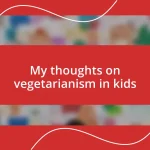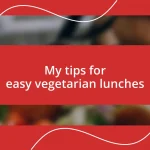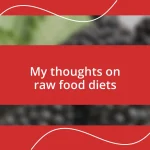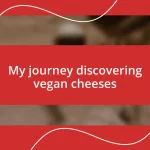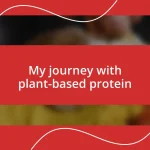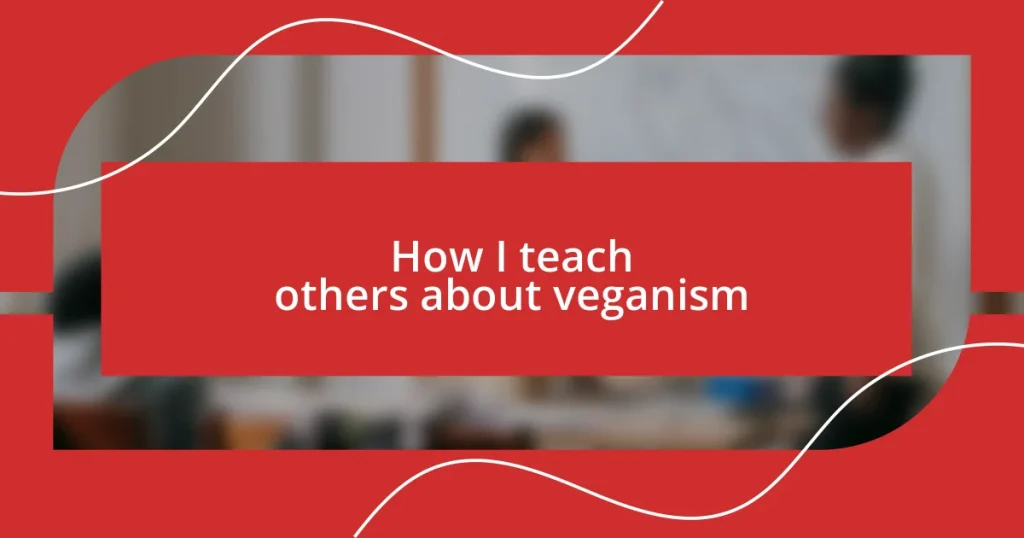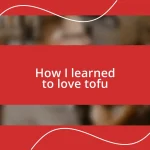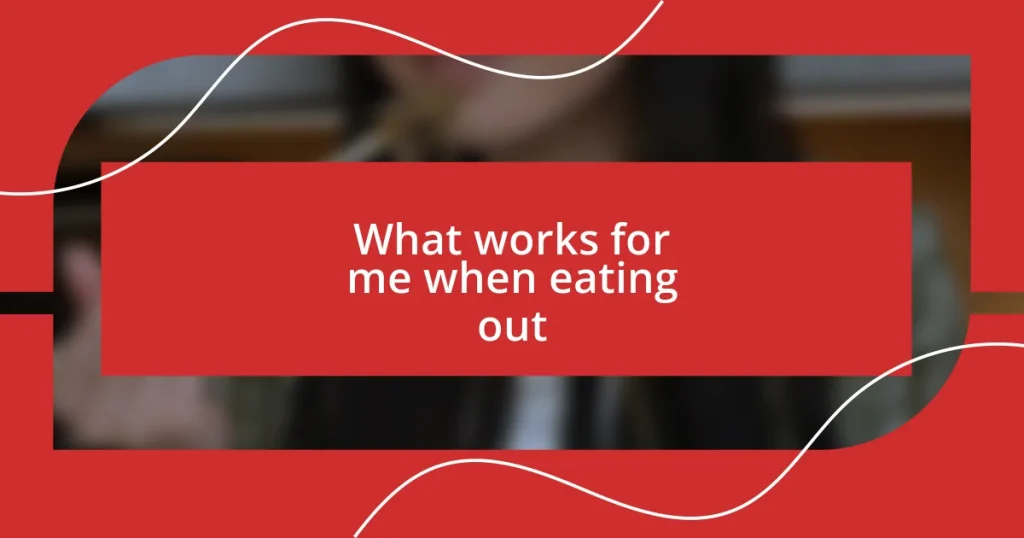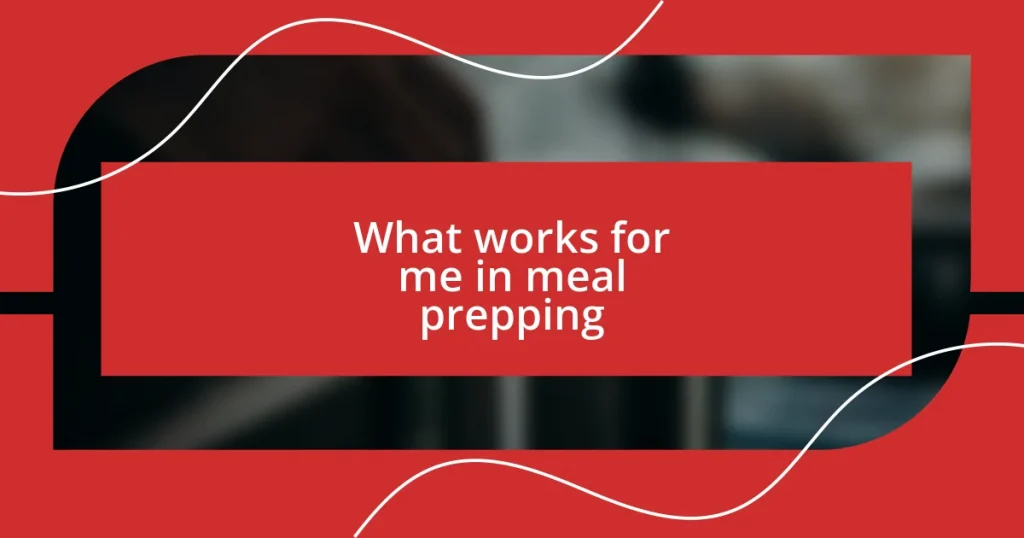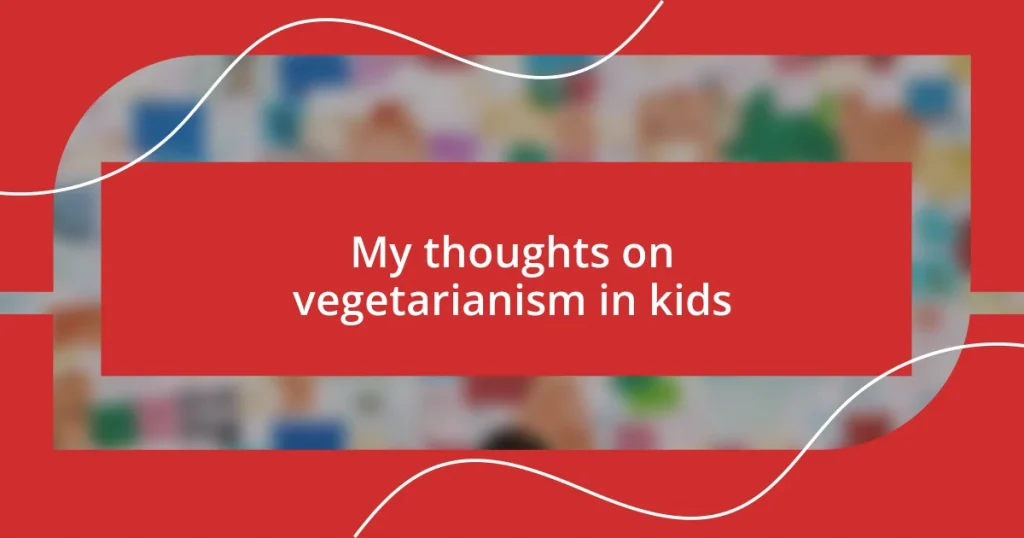Key takeaways:
- Adopting veganism enhances personal health, reduces environmental impact, and promotes compassion towards animals.
- Effective discussions about veganism benefit from open-ended questions, personal storytelling, and positive non-verbal cues to build trust and engagement.
- Building a supportive vegan community is essential, as shared experiences and connections reinforce commitment to the lifestyle and inspire personal growth.
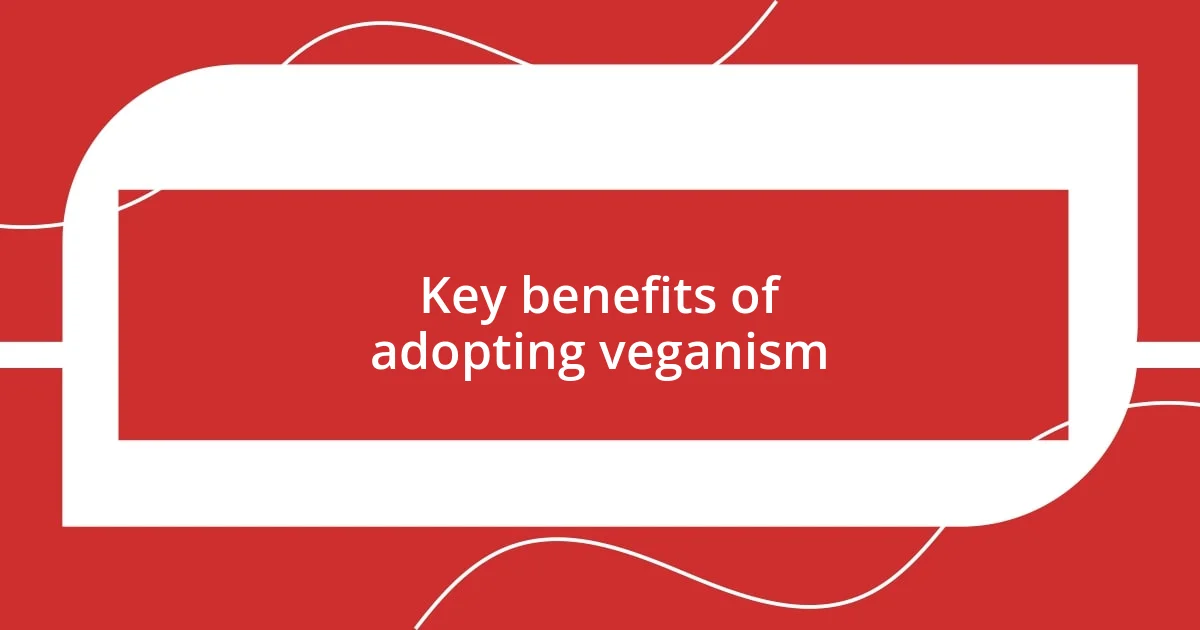
Key benefits of adopting veganism
One of the most striking benefits of adopting veganism is the impact on our health. When I switched to a plant-based diet, I quickly noticed an increase in my energy levels and improved digestion. Isn’t it amazing how the food we consume can so profoundly affect how we feel daily?
Beyond personal health, veganism has far-reaching environmental benefits. By reducing reliance on animal products, we can significantly lower our carbon footprint. I often reflect on how small individual choices can contribute to creating a healthier planet. Have you ever considered how your dietary decisions might influence climate change?
Lastly, embracing a vegan lifestyle fosters a deeper connection with animals and promotes compassion. I remember the first time I watched a documentary on factory farming—it shifted my perspective entirely. It made me think, how can we call ourselves kind creatures when we turn a blind eye to suffering? Choosing veganism has allowed me to align my eating habits with my values, creating a sense of fulfillment that extends beyond my plate.
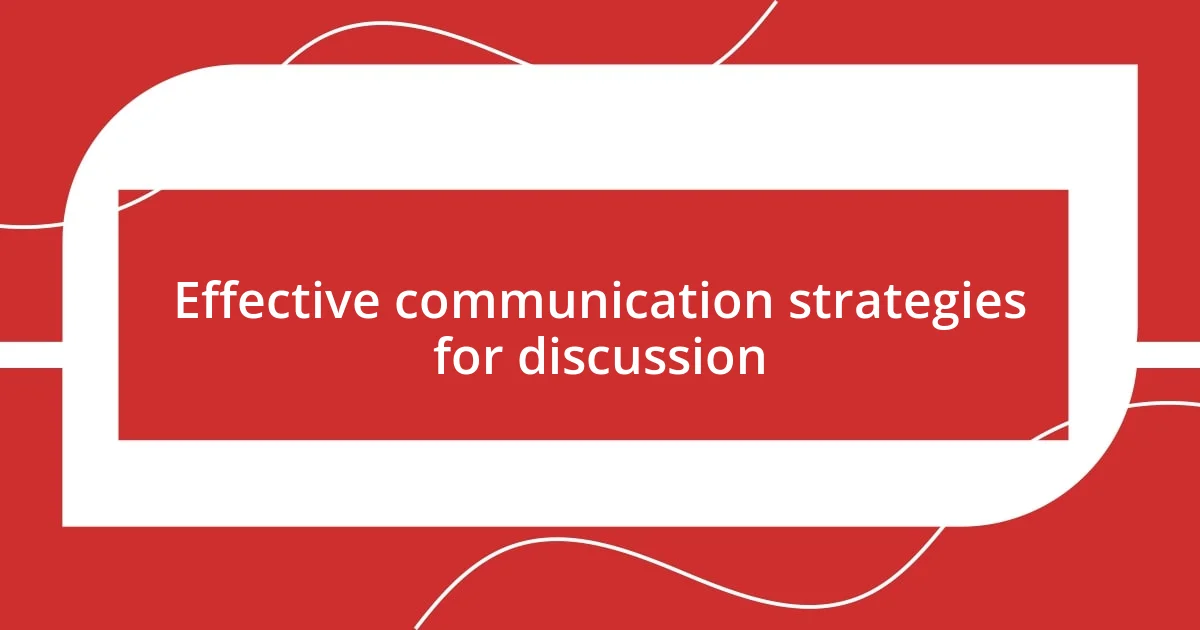
Effective communication strategies for discussion
Effective communication is vital when discussing veganism, as it allows for the sharing of ideas while actively listening to others. I’ve found that asking open-ended questions often helps to foster meaningful dialogue. For example, when someone expresses skepticism about vegan diets, I might ask, “What concerns do you have about plant-based eating?” This approach not only shows that I value their opinion, but it also opens the door for a more productive discussion.
Another key strategy is using relatable and personal stories that resonate on an emotional level. I remember sharing my initial experiences with veganism with a friend who loved to cook. I told her about my struggles in finding satisfying recipes and how I eventually discovered the joy of creating vibrant, flavorful dishes. By painting a picture of my journey, I made the idea of veganism more accessible and inviting. People often connect better with narratives rather than facts alone.
Non-verbal cues also play a significant role in effective communication. I’ve noticed that maintaining an open posture and making eye contact can significantly impact how my message is received. If I’m genuinely interested in listening to someone’s viewpoint, this openness encourages them to share more freely. This technique not only enhances understanding but also helps build trust, which is essential for effective discussions about topics as personal as dietary choices.
| Strategy | Description |
|---|---|
| Ask Open-Ended Questions | Stimulates dialogue and encourages sharing of thoughts. |
| Share Personal Anecdotes | Makes the topic relatable and engaging through storytelling. |
| Use Non-Verbal Cues | Enhances understanding and builds trust with body language. |
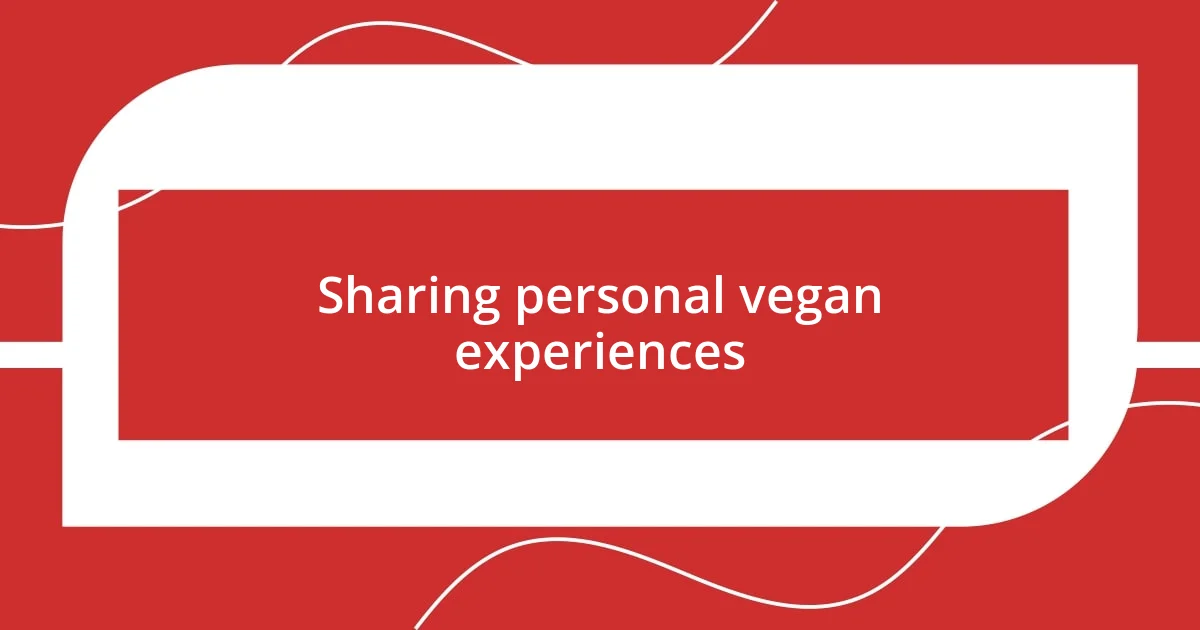
Sharing personal vegan experiences
When I first transitioned to veganism, sharing my journey felt like opening a new chapter in my life. I vividly recall a dinner gathering with friends where I brought a vibrant quinoa salad bursting with colors and flavors. Their curious glances and questions ignited a delightful conversation about nutrition and cooking. It was rewarding to see their intrigue piqued, prompting some of them to explore plant-based recipes themselves.
- Cooking together greatly strengthens connections and encourages curiosity.
- Underlying emotions, like compassion and health awareness, often surface during food discussions.
- Personal testimonials create a bridge of understanding, making it easier for others to relate to the vegan lifestyle.
- I’ve often found that sharing the excitement of discovering a new favorite vegan dish opens the door for others to give it a try.
One powerful experience that sticks with me is when I volunteered at a local animal sanctuary. While caring for rescued animals, I saw firsthand the love and joy they expressed. I shared those moments with friends who questioned my dietary choices, reminding them that our food decisions directly impact these sentient beings. Watching their expressions change when they recognized the emotional connection made me realize how personal experiences can truly resonate, allowing the conversation to shift from skepticism to understanding.
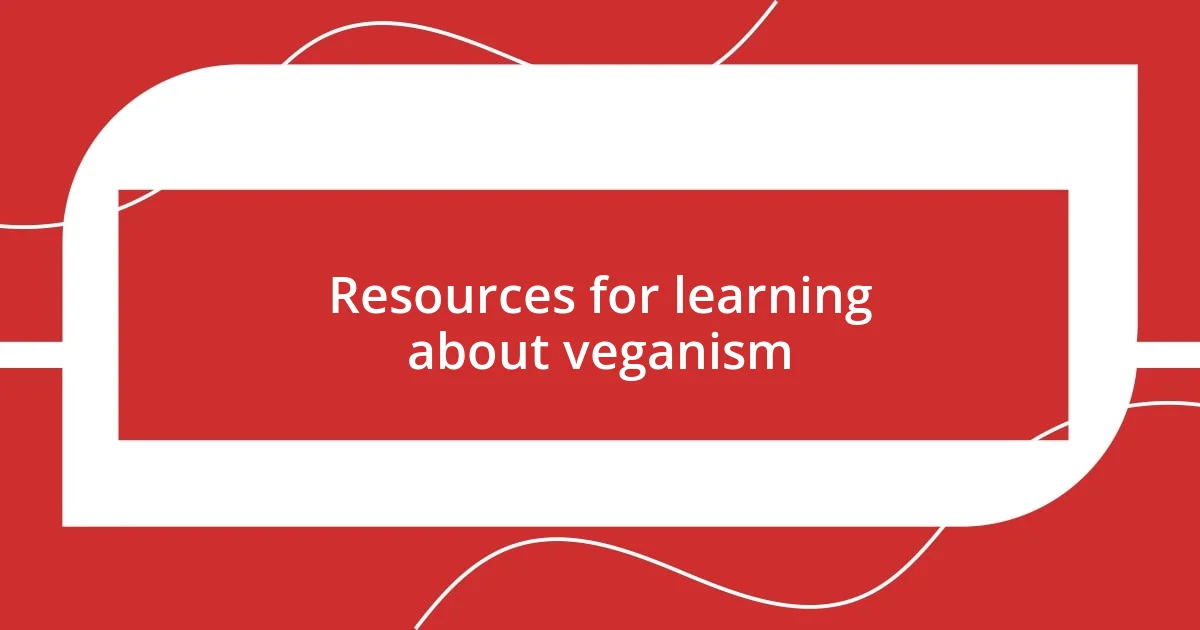
Resources for learning about veganism
Learning about veganism can feel overwhelming at first, but there are some fantastic resources that can ease the journey. One of my favorites is documentaries. I remember the eye-opening experience I had watching “Forks Over Knives.” It wasn’t just about the facts; the visuals and personal stories ignited my passion for plant-based living. This film opened my eyes to how our dietary choices affect our health and the planet. It’s a great starting point for those curious about veganism.
Books can also provide deep insights into veganism. For instance, when I picked up “How Not to Die” by Dr. Michael Greger, I was struck by the detailed research interwoven with practical dietary advice. The author’s approach really helped me understand the health benefits of plant-based eating. I often recommend this book to friends looking to understand the science behind veganism, as it combines empirical evidence with relatable narratives that speak to everyone.
Online communities have become invaluable resources as well. I remember joining a Facebook group dedicated to vegan cooking, and it transformed my understanding of meal preparation. The shared recipes and personal success stories not only inspired me but also provided a supportive environment where I felt encouraged to ask questions. Engaging with like-minded individuals creates a sense of accountability and community, making the journey toward veganism more enjoyable and accessible. Have you ever thought about how support from others can influence your choices? In my experience, that connection can make all the difference.
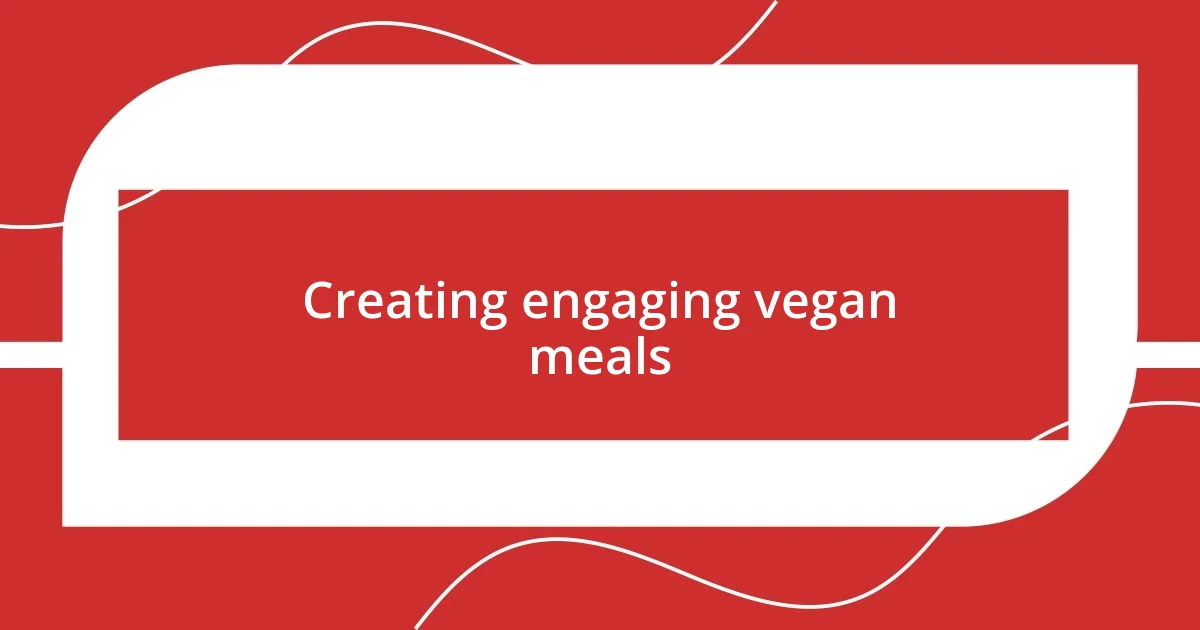
Creating engaging vegan meals
Creating engaging vegan meals is truly an adventure, and I love discovering new ways to make plant-based dishes not just healthy, but also visually appealing and flavorful. I remember the first time I made roasted vegetable tacos. The vibrant colors of the bell peppers, purple cabbage, and avocado not only made my plate pop but drew my friends in. They couldn’t believe how delicious vegan food could be! Have you noticed how visuals play a huge role in what we eat?
I often experiment with different spices and textures to keep my meals exciting. A memorable dish I created was a creamy chickpea curry layered with coconut milk and fresh spinach. The aroma filled my kitchen, and one whiff was enough to spark curiosity. I served it with fluffy brown rice and watched as my guests savored every bite. Isn’t it fascinating how a single dish can change perceptions and open conversations about veganism?
In my experience, storytelling within meals can enhance the connection to the food we share. I once hosted a “Vegan Taste Test” evening, featuring dishes inspired by various cuisines—Mediterranean, Mexican, and Asian. Each dish had a little backstory, like how the falafels reminded me of vibrant street markets in the Middle East. Sharing these personal ties to the meals created a warm atmosphere that not only engaged my friends but also encouraged them to reflect on their own food stories. Have you ever thought about how sharing our food experiences can transform a simple meal into a meaningful gathering?
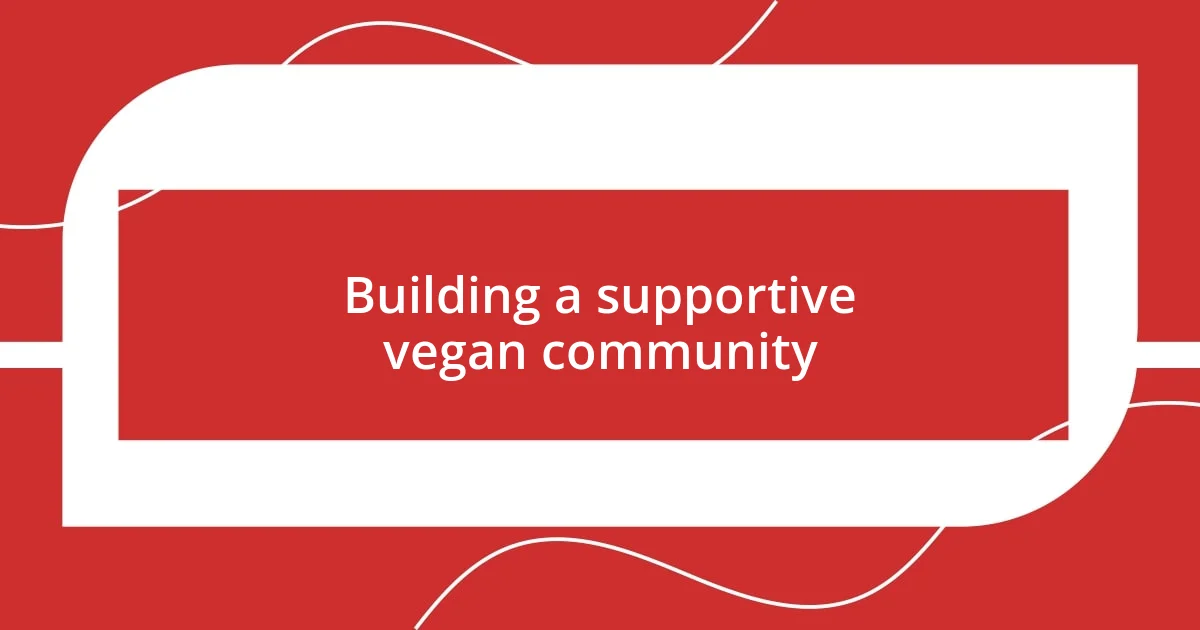
Building a supportive vegan community
Building a supportive vegan community isn’t just about sharing food; it’s about fostering connections. I remember the warmth I felt when I attended my first local vegan potluck. Everyone brought their favorite dishes and shared stories of why they chose plant-based living. It was inspiring to see how each person’s journey was unique, yet our collective experience created a sense of belonging. Have you ever been in a place where you felt you truly belonged? That’s the power of community.
Engaging with others in your vegan journey can also ignite passion and motivation. I often participate in volunteer events focused on animal welfare, and these experiences have enriched my understanding of the reasons behind veganism. Each time I connect with like-minded individuals, I leave feeling invigorated and inspired. The discussions we have, the laughter we share, and even the challenges we face together create bonds that reinforce our commitment. Have you experienced that uplifting feeling when surrounded by people who share your values?
Online platforms can take this support even further. Recently, I challenged myself to join a worldwide vegan challenge hosted on social media. It connected me with fellow vegans across different continents, sharing daily tips and encouragement through posts and comments. One day, I received a message from someone across the globe thanking me for a recipe I shared, and it truly warmed my heart. Knowing I was able to inspire someone else reminded me of the interconnectedness we all have, no matter where we are. Isn’t it amazing how technology can bridge distances and build communities?


